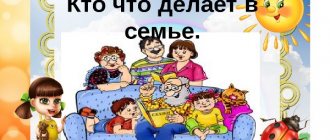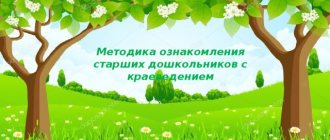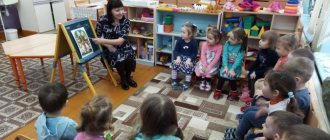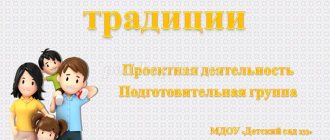Formation of family traditions and values among preschool children in preschool educational institutions
Municipal Budgetary Preschool Educational Institution d/s No. 4 “Bell”
Report on the topic:
“Formation of family values and traditions among preschool children in preschool educational institutions”
Educator: Fisun L.I.
Goryachy Klyuch City 2019
In the context of dynamic changes in our society, when many traditions of Russian family education have been lost, the level of family breakdown is high, many children do not feel the value of family relationships.
Currently, there are socio-economic factors at work, which, on the one hand, have led to the expansion of the economic function of the family, on the other, to a weakening of the educational function, which negatively affects both the family and society as a whole.
Focus on family values is an important part of the spiritual and moral development and personality education of preschool children. The family is an enduring value for the development of every person, plays an important role in the life of the state, in raising new generations, ensuring social stability and progress.
Family traditions are, first of all, the atmosphere at home, the way of life and habits of all family members. The child accepts the world through the eyes of his parents. They are an example for him. Each family has its own traditions: a passion for sports, summer country holidays, Sunday walks for all family members, joint lunch, dinner, tea drinking and much more.
The problem of reviving family traditions becomes relevant and is determined by the enormous role played by the family and family traditions in the development and formation of the social and moral culture of the child. Family traditions and relationships leave an imprint on the formation of a child’s moral qualities. No wonder folk wisdom says: “A child learns what he sees in his home. His parents are an example to him.”
It is possible to form family values in preschoolers through the interaction of a preschool educational organization and the family, through various activities aimed at solving this problem.
The interaction of educators with parents in this direction contributes to the formation of a caring attitude towards family values, the preservation of family ties in a way that only the family can ensure the preservation of national traditions and customs, songs, sayings and commandments, and ensure the transmission to descendants of all the positive things that are accumulated by the family and the people. Children need to be encouraged to be interested in their genealogy, in the study of national, historical, professional roots and their kind in different generations.
The current Federal State Educational Standard for preschool education declares the need for the formation of family values in preschool children as part of the development of the social and communicative direction of development. Projects of educational programs for preschool education set tasks for the formation of family values, respect for the family and feasible participation in family affairs in children at all stages of preschool childhood.
For preschoolers, the values associated with kinship are relevant: the value of belonging to a family, the value of having close and distant relatives, the value of family history and family traditions.
The main task of the teacher in organizing interaction with parents is to intensify the pedagogical and educational activities of the family, to give it a purposeful, socially significant character. The relationships of all participants in the educational process, positive life examples and spiritual values contribute to the development of personality. Purposeful communication with the family, preservation and strengthening of family values and traditions are of great social importance.
When engaged in the upbringing and formation of the foundations of family affiliation among preschool children, it is recommended to:
- increase the role of family values in the development of a child’s personality.
- create conditions for effective interaction between kindergarten and family to familiarize preschoolers with the world of family traditions;
- involve parents in familiarizing children with family values and family history;
- provide parents with theoretical knowledge and practical skills for positive interaction with children in various activities;
- arouse interest among children and parents in the family and its history;
- show children the importance of family in the life of every person;
- to cultivate in children love and respect for their parental home, family, their loved ones, and the older generation.
In the formation of family values, the leading activity is play. In the teacher’s work on the formation of family values, one can use: psychological games, role-playing games, fairy tale therapy, music therapy, etc., for example, a child is asked to compose a fairy tale about a family, in which he will talk about fictional characters, their professions and hobbies.
When solving problems of developing a focus on family peace and family values in children together with their parents, you can use the following activities in your work:
- Family artistic and creative projects:
- "Family coat of arms"
- "Genealogical family tree"
- "The happiest day of our family"
- “My child from the cradle”
- "Little discoveries in my big family"
- “My mother is a needlewoman”
- “The old clock is still running”
- “My family – everyday life and holidays”
- "My family's healthy dish"
It is a mistake to assume that family values can be formed in a child only spontaneously. As a rule, if you do not pay due attention to this process, then family values become “incomplete.” By omitting certain details, parents provoke in children a feeling of detachment, limitation, and anxiety. An older preschooler, due to his age, is already able to give some assessment of himself and other people, the nature of relationships within the family, and perceive and analyze the attitude of others towards him. In most cases, adult family members do not notice that they are interacting incorrectly with the child. That is why it is necessary to purposefully organize the formation of family values for children of senior preschool age.
Therefore, the main goal of the educational process for the formation of family values and traditions is for children to assimilate eternal values, cultivate mercy, respect, and love for family and friends.
Project “The Role of Traditions in My Family”
- April 20, 2011
Competition "Children's Research Project"
Nomination "The World Around"
At school, during environmental lessons and at extracurricular activities, we often talk about family values and traditions. This topic was very interesting to me, because family is the most important thing for a person.
When they asked me if we have traditions in our family, I thought about it. I have some questions:
- What are family traditions?
- Are there traditions in my family?
- How important are traditions in my family?
- Can traditions really make a family stronger?
The purpose of my work: To find out the role of traditions in the formation of a strong and friendly family.
Objectives: find out
1) what are family traditions;
2) what traditions do my family have;
3) how traditions influence relationships in the family.
Hypothesis : we assume that: good traditions make a family strong and friendly; Decent people grow up in such a family.
Research methods helped me get answers to my questions : observation, survey, working with dictionaries, searching for information on the Internet.
Main part
What are family traditions?
In one of the articles I read: “Family traditions are the usual norms, behavior patterns, customs, and views accepted in the family that are passed on from generation to generation.” If you close your eyes and mentally say the word “childhood”, then something comes to mind that is unique to your family. It is precisely this “something” that can be called a family tradition.
Family traditions are the spiritual atmosphere of the home.
I really like the poem about Tatiana Bulkovskaya’s family, which I found on the Internet.
What could be more valuable than family? Your father's house greets you with warmth, They always wait for you here with love And see you off on your journey with kindness!
Father and mother and children sit together at the festive table, and together they are not at all bored, but it is interesting for the five of them.
The baby is like a pet to the elders. Parents are wiser in everything, Beloved dad is a friend, breadwinner, And mom is closest to everyone, dearest.
Love it! And appreciate happiness! It is born in a family, What could be more precious than it On this fabulous land!
Such beautiful, warm words about family could be written by a person who loves his family. This poem also describes traditions: spending holidays together, respect for father and mother, warm relationships.
In another article, I also found the following definition: “Family traditions are repeated joint actions, rites, and rituals that are clear to others and passed on from generation to generation.”
If so, then I can say with confidence that traditions are faithful companions of our family; they are closely intertwined with all the events of our lives.
I have a father, mother, sister, grandmothers, grandfathers. And each family member leads his own family tradition.
Many traditions entered our lives not with the advent of my family, but came to us from time immemorial, passed on from generation to generation; these are Kazakh folk traditions. Each generation of Kazakhs, regardless of the era and conditions in which it lived, sacredly fulfilled the order of their distant ancestors, clearly expressed in the proverb: “Alty zhyl ash bolsan da, atanynyn saltyn umytpa” (Even if you starve for six years, do not forget the custom of your fathers) .
I’ll start with birth, but not mine, but my family, with how my parents got married. The wedding took place in several stages over the course of a month. The first ceremonial rite was “Saukele kigizu” (saukele is the bride’s headdress, kigizu is to wear). Dad's relatives were invited to the solemn holiday at my mother's house. Mom was dressed up and introduced to her future relatives. Then my mother’s parents again organized a big celebration “kyz uzatu” (seeing off the bride). Dad came to this send-off with friends and close relatives, the celebration lasted all night, and the next morning mom and dad were escorted to their new home. According to custom, the girl was sent along with the matchmakers early in the morning, at sunrise. The sunrise symbolized the beginning of a new life. But the story of my parents’ wedding does not end there; the most important thing remains – the wedding ceremony, “Neke kiyar”. This ceremony took place in the mosque, where my parents swore an oath of love and fidelity to each other. And then, finally, there was the wedding, “the one”, all the relatives were gathered, about 200 people in total.
When I was born, my parents, according to tradition, organized a holiday to which the woman’s relatives were invited - “besik toy” (besik-cradle, toy-holiday). When I was first put into the cradle, the ceremony of “besikke salu” (putting into the cradle) was performed. The right to carry out such a responsible mission was given to my great-grandmother. A tumar was tied to the head of the cradle, an amulet that, according to legend, will protect the child from evil spirits. Then, sweets and other sweets were thrown into the hole located in the middle of the cradle, where a special pot was installed to ensure the baby was dry and clean (a distant ancestor of diapers!). They were immediately dismantled by women who did not have children, holding out their palms.
Our family also has a tradition of keeping family heirlooms and memorabilia. So we have preserved the cradle that my great-grandfather made for his son, my grandfather. This cradle is 58 years old.
We also have a flour stall that is still in use for its intended purpose; it was made by my great-great-grandfather, and this stall is over 150 years old.
Every Sunday we have a family dinner, cook different dishes together, and then eat it all together. Usually guests come to us on this day, and they never leave without a treat. The Kazakh people are famous for their hospitality. To greet a guest with honor and treat him is a sign of generosity.
Every year our whole family goes to Kazakhstan to visit my second grandparents. We are bringing various gifts, our crafts and treats. They love us very much there and always wait for us.
Family traditions are what unites the family, makes us friendlier and stronger. Education, rules of behavior and spirituality are based on traditions. This means that the family will withstand any difficulties and will go through life boldly and confidently.
Conclusion
When I did this work, I was once again convinced that my family was strong and friendly, because my mother, father, and grandparents supported me and told me about the traditions of our family.
Now I know for sure that supporting each other in business is another tradition of our family that my elders didn’t tell me about. I figured it out myself. This was my joyful discovery.
When I grow up, I will have my own family. I think that I will bring the best traditions to my family. This is important because such a family raises decent, kind, cheerful people who love their family, their homeland.
Project presentation
Project “The Role of Traditions in My Family”
Author: Toksanova Madina, student of 3 “A” class of the Municipal Educational Institution “Elementary School No. 35” in the city of Omsk. Head: Minina Irina Valerievna, primary school teacher of the highest qualification category, Municipal Educational Institution “Primary Secondary School No. 35” in the city of Omsk. 19 years of experience.





